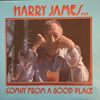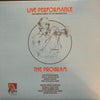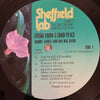





Harry James And His Big Band – Comin' From A Good Place (Direct to Disc, Unsealed)
RARITY – Unsealed
Trumpet, Leader – Harry James
Bass – Dave Stone
Bass Trombone – Houghton Peterson
Drums – Les Demerle
Piano – Tommy Todd
Saxophone – Bob Lawson, Mel Kunkle, Norman Smith , Pat Longo, Quin Davis
Trombone – Chuck Anderson, Tom Padveen
Trumpet – William Hicks, Gino Bozacco, Nick Buono, Robert Berrenson
Written by Harry James, Ernie Wilkins (A1, B5), Mack Gordon, Harry Warren (A2), Bennie Moten, Buster Moten (A3), Count Basie, Benny Goodman, Harry James (A4), Norman Gimbel, Michel Legrand (B1), Julian Dash, Buddy Feyne, Erskine Hawkins, Buddy Johnson, William Johnson (B2), Sid Garris, Sy Oliver (B3), Hank Cochran (B4)
1LP, Standard sleeve
Direct to Disc
Record Color : Black
Speed : 33 RPM
Size : 12’’
Stereo
Live
Record press: unspecified
Label : Sheffield Lab
Original Label : Sheffield Lab
Recorded in Hollywood, California July 29th & 30th, 1976
Recorded by Ron Hitchcock
Engineered by Richard "Slim" Doss, Bud Wyatt
Produced by Doug Sax, Lincoln Mayorga
Mastered by Sherwood Sax
Artwork by "Chance" Lake
Design & Photography by Christina Farley
Liner Notes by Fred Hall
Originally released in 1976
Reissued in 1989
Tracks:
Side A:
1. The Footstomper
2. You'll Never Know
3. Moten Swing
4. Two O'Clock Jump
Side B:
1. Watch What Happens
2. Tuxedo Junction
3. Opus Number One
4. Make The World Go Away
5. Blues For Sale
Reviews:
"Comin' from a Good Place was an album that Harry James recorded during a two-day period in 1976. James plays well enough (although the trumpeter was no longer trying to hit high notes), but the charts, by the likes of Ernie Wilkins, Thad Jones, and Bob Florence, offer no revelations and the sidemen (other than drummer Les DeMerle) do not stand out. "Watch What Happens" and "Make the World Go Away" are throwaways, but "Moten Swing," "Tuxedo Junction," and "Blues for Sale" have their moments of interest." AllMusic, Review by Scott Yanow
Harry Haag James (March 15, 1916 – July 5, 1983) was an American musician who is best known as a trumpet-playing band leader who led a big band to great commercial success from 1939 to 1946. He broke up his band for a short period in 1947, but shortly after he reorganized and was active again with his band from then until his death in 1983. He was especially known among musicians for his technical proficiency as well as his tone, and was influential on new trumpet players from the late 1930s into the 1940s.
After coasting through the mid-1950s, James made a complete reevaluation of where he was heading in his musical career. Count Basie provided the impetus by making a significant comeback with his newly formed “16 Men Swinging” band, and James wanted a band with a decided Basie flavor. James signed with Capitol Records in 1955, and two years later, after releasing new studio versions of many of his previously released songs from Columbia Records, James recorded ten new tracks for an album entitled Wild About Harry!. This album was the first in a series released on Capitol, and continuing later on MGM, representative of the Basie style that James adopted during this period, with some of the arrangements provided by former Basie saxophonist and arranger Ernie Wilkins, whom James hired for his own band.
James felt strongly about the music he both played and recorded. In 1972 while in London, he did an interview with the English jazz critic Steve Voce, who asked if the biggest audience was for the commercial numbers he had recorded. James visibly bristled, replying “That would depend on for whom you are playing. If you’re playing for a jazz audience, I’m pretty sure that some of the jazz things we do would be a lot more popular than ‘Sleepy Lagoon,’ and if we’re playing at a country club or playing Vegas, in which we have many, many types of people, then I’m sure that ‘Sleepy Lagoon’ would be more popular at that particular time. But I really get bugged about these people talking about commercial tunes, because to me, if you’re gonna be commercial, you’re gonna stand on your head and make funny noises and do idiotic things. I don’t think we’ve ever recorded or played one tune that I didn’t particularly love to play. Otherwise, I wouldn’t play it.”
Direct-to-disc (D2D) recording refers to sound recording methods that record audio directly onto analog disc masters bypassing steps as master tapes, overdubs, and mix downs from multi-tracked masters. This approach avoids problems of analog recording tape such as tape hiss (high frequency noise).
Ratings :
AllMusic : 3 / 5 ; Discogs : 5 / 5



